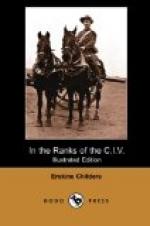A much-needed convoy turned up from Bethlehem to-day with ammunition for us. We took our waggon down in the morning and filled it. A box of matches per man was also served out. In the evening came the joyful news that we were to start tomorrow, two days’ fighting expected. Williams and I made a roaring fire of an ammunition box in honour of the occasion, and a grand supper of mealy-cakes and tea, and smoked and talked till late. Summing up our experiences, we agreed that we enjoyed the life thoroughly, but much preferred marching to sitting still. Both thoroughly fit and well, as nearly all have been since campaigning began. In numbers, I hear, we are twenty-two short of our full complement.
One thing that makes a great difference is that campaigning has become routine. One doesn’t worry over little things, as one did in early days, when one dreamt of nose-bags, bridoons, muzzles, etc., and the awful prospect of losing something important or unimportant, and when one harnessed-up in a fever of anxiety, dreading that the order “hook in” would find one still fumbling for a strap in the dark, in oblivion of the hot coffee which would be missed cruelly later. In a score of little ways one learns to simplify things, save time, and increase comfort. Not that one ever gets rid of a strong sense of responsibility. Entire charge, day and night, of two horses and two sets of harness, is no light thing.
July 22.—Sunday.—Reveille at six. Boot and saddle at 7.30; started at 8.30—a lovely day. Marched out about three miles with the brigade, and are now halted. An officer has just explained to the non-coms, what is going to happen. The Boer forces are in the mountains east of us, whence there are only three outlets, that is, passes (or neks, as the Dutch call them), one at each corner of a rough triangle. British columns are watching all these, Hunter, Paget, Clements, and Bruce Hamilton. Ours is called Slabbert’s Nek, and to-day’s move is a reconnaissance in force towards it, without likelihood of fighting. The delay here has been to allow every column to get into position, so that when an attack is made there may be no escape from the trap. The trap, of course, is a very big one, one corner, I believe, being at the Basuto border. Something like a whole army corps is engaged. It is most novel and unusual to know anything about what one is doing. It makes a marvellous difference to one’s interest in everything, and I have often wondered why we are not told more. But I suppose the fact is that very few people know.
We halted while the mounted troops made a long reconnaissance, and then came back to camp. It clouded up in the evening, and about eight began to rain, and suddenly, with no warning, to blow a hurricane. I rushed to my harness, covered up my kit in it, seized my blankets and bolted for a transport-waggon, dived under it, tripping over the bodies of the Collar-maker sergeant and his allies, breathlessly apologized, and disposed myself as best I could. But the rain drove in, and there seemed always to be mules on my feet; so, when fairly wet through, I crept out and joined a circle at a great fire which similar unfortunates had built, where we cooked two camp-kettles full of mysteriously commandeered tea and porridge, and made very merry till reveille at 4.30 in the morning.




